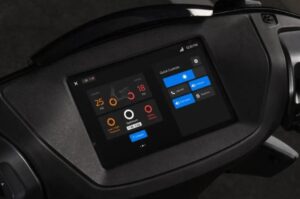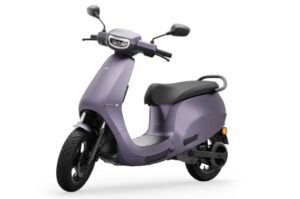
Humane, a startup founded by former Apple employees, has unveiled its much-anticipated product. ‘Humane AI Pin’ is set to launch on November 9, 2023, this innovative wearable has already captured attention. By earning a spot on Time Magazine’s list of The Best Inventions of 2023. The “Ai Pin” might cost $1,000 and require a monthly subscription for data.
What is Humane AI Pin?
The Humane AI Pin is a wearable device that introduces a voice assistant powered by generative artificial intelligence (GenAI) promising to revolutionize the way users interact with technology. Although the product has not yet hit the market. Time Magazine has provided an exclusive look at the device, showcasing its sleek design and key features.
The AI Pin is designed to securely attach to your clothing using magnetic technology, and it harnesses a combination of proprietary software and OpenAI’s GPT-4 to drive its extensive array of capabilities. This encompasses a wide range of functions, from placing calls to translating spoken language and even deciphering the nutritional content of a candy bar.
Humane’s Inventor and Co-Founder, Imran Chaudhri takes the lead in the introduction, demonstrating his unique ability to answer phone calls through a simple gesture. A tiny pin attached to his jacket illuminates and projects the incoming call onto his palm. When his wife, Bethany Bongiorno, a former Apple software engineering expert, contacts him, Chaudhri effortlessly responds, bypassing the conventional method of pressing the green button on a smartphone. Instead, he utters the command, “I’m going to have to get this,” a phrase that is synonymous with answering the call and triggers the phone’s pickup function.
Imran Chaudhri emphasizes that the Humane AI Pin doesn’t require any additional devices or electronics to function. Users only need to wear or attach it to their clothing to activate its features. While this concept might sound like something out of a Black Mirror episode, envisioning a world where technology is even more futuristic, Humane is steadily progressing towards the release of its wearable projector and smartphone in the near future.
Humane Ai Pin Debut at Paris Fashion Week
Recently, the company introduced the Ai Pin in its entirety at a fashion show in Paris, in collaboration with Coperni, as a means to showcase the device’s fresh design. Humane stated, “Supermodel Naomi Campbell is the first individual outside the company to sport the device in a public setting, preceding its full reveal on November 9.”

Design and Indicators
The Humane AI Pin boasts a stainless steel frame, giving it a sophisticated and modern appearance. One of the standout features is its dual-indicator system. A multi-colored light serves as a signal that the device is listening to user queries or commands. By enhancing the interaction experience. The second indicator, an orange-colored light known as the “Trust Light,” activates when the device’s camera or microphone is in use. By addressing privacy concerns and providing users with a visual cue for when their data is being accessed.
Features and Capabilities
Humane’s Inventor and Co-Founder, Imran Chaudhri, showcased the device’s capabilities during a Ted Talk. The AI Pin can project a screen onto the user’s hands, offering a unique and immersive experience. One notable demonstration involved scanning a packaged food item to check for allergens, a potential game-changer for individuals with allergies. Additionally, the device demonstrated language translation capabilities, generating audio in the user’s voice and style, showcasing the versatility of Humane AI Pin.
Key Principles of Humane AI
1. Ethical Frameworks
Establishing robust ethical frameworks is paramount in the development of Humane AI. This involves addressing bias, ensuring transparency, and safeguarding user privacy. A clear ethical foundation not only aligns AI systems with societal values. But also contributes to long-term trust and adoption.
2. User-Centric Design
Humane AI is user-centric, focusing on enhancing user experiences rather than optimizing for efficiency. User-centric design principles, such as empathy mapping and user feedback loops, play a pivotal role in tailoring AI systems to meet human needs.
Real-World Applications
Humane AI finds practical applications across diverse sectors, ranging from healthcare to education. Let’s delve into some compelling use cases:
1. Healthcare Assistance
In the healthcare domain, Humane AI assists medical professionals in diagnosis and treatment planning. The integration of empathetic interfaces ensures a more compassionate interaction between AI-driven tools and patients.
2. Educational Enhancement
Humane AI transforms education by personalizing learning experiences. Adaptive learning platforms, powered by AI, cater to individual student needs, fostering a more inclusive and effective educational environment.
Challenges and Future Outlook
While the strides in Humane AI are commendable, challenges persist. Balancing innovation with ethical considerations, addressing bias, and navigating regulatory landscapes are ongoing challenges. But, these challenges present opportunities for continuous improvement and refinement.
Conclusion
Humane AI marks a paradigm shift in the AI landscape. By prioritizing human well-being and ethical considerations. By embracing user-centric design, ethical frameworks, and real-world applications. We pave the way for a future where AI not only performs tasks but enhances the human experience. The evolution of Humane AI Pin holds the promise of a more inclusive, empathetic, and beneficial technological era.
Also Read: How Does Chatbot help in Increasing Lead Generation?







